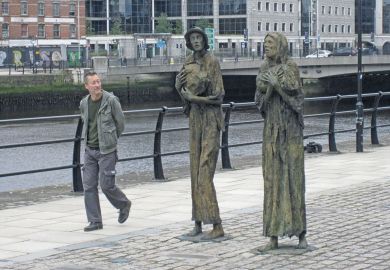Students at Trinity College Dublin have called for the university to limit tourism, describing difficulties navigating across campus and disturbance to their studies.
In a recent op-ed for student newspaper The University Times, second-year philosophy and economics student Mia Craven details “the frustration that arises from studying on a campus that is inundated with tourists”, citing insufficient seating, overcrowded toilets and “noise, crowds and distraction” during exam season.
“[The] college’s profit-driven prioritisation of tourists creates a stressful environment that is conducive neither to academic success nor student well-being,” Ms Craven writes, calling for a delineation between tourist and student facilities and the closure of lecture halls and student spaces to the public.
Ms Craven told Times Higher Education that her article reflected a commonly held sentiment at the university. “I regularly hear offhand complaints about tourists and how they make campus life that bit more difficult than it needs to be,” she said. “While on-campus tourism tends to just be a mild annoyance, it is a widely felt annoyance nonetheless.”
Claudia Peroni, a final-year sociology PhD candidate and the president of the Postgraduate Workers’ Organisation (PWO), told THE that she experienced “huge difficulties and added time in going through campus” and had been disrupted by noise when working.
In April, Ms Peroni took part in a PWO blockade of Trinity’s Old Library, which holds the Book of Kells, calling for the recognition of postgraduate researchers as employees. “We have found that tourism has become so important that the only way for us to make [the] college listen to our voices and demands is by threatening that source of income,” Ms Peroni said.
“I think TCD is a historical landmark that should be shared and appreciated,” Ms Peroni continued. “However, I do believe that a reduction in the numbers allowed on campus each day, or at the very minimum a smarter way of managing access and mobility through campus that reserves some entrances and pathways for the college community, would be greatly beneficial.”
Not all Trinity students consider campus tourism to be problematic. Miriam Onwuegbusi, a second-year undergraduate studying music and German, told THE: “Tourism [has made] me appreciate the college campus a lot more.”
Tourism had interrupted her studies on “rare” occasions, Ms Onwuegbusi said, and she had occasionally experienced tourists “yelling, running, pushing and throwing things”.
But she said that she enjoyed seeing visitors admiring the campus, and noted opportunities for students to be employed as guides on campus walking tours like the Trinity Trails.
“I do believe that TCD has done a fair job at balancing the needs of tourists and students, but there is always room for improvement,” she said, advising that the university install more benches to combat a lack of seating.
“Tourism is only effective”, she added, “if both the locals and tourists have mutual respect for one another – and for the most part I have seen that here at TCD.”
A Trinity spokesperson said that generating income “has become increasingly important due to the continued underfunding of the higher education sector in Ireland” but said that the institution monitored the impact of tourism and engaged “consistently” with Trinity’s student union on this topic.
“Our priority is always to deliver on the best teaching, learning, research and university experience for students and staff. Income generated through tourism is reinvested back into delivering on this priority,” they said.
Register to continue
Why register?
- Registration is free and only takes a moment
- Once registered, you can read 3 articles a month
- Sign up for our newsletter
Subscribe
Or subscribe for unlimited access to:
- Unlimited access to news, views, insights & reviews
- Digital editions
- Digital access to THE’s university and college rankings analysis
Already registered or a current subscriber?










